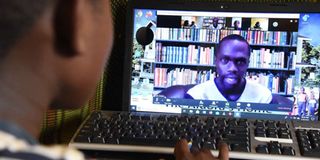E-learning OK but blended is the way to go

Online learning is inevitable.
What you need to know:
- But typical online education takes time and resources to establish.
- Not all courses can be successfully taught online, especially for first-time students.
- Reliable and affordable internet connectivity, electricity supply and basic education digital literacy are just but minimums.
Colleges and universities have finally accepted the inevitability of the e-learning mode as a means of instruction. But when the institutions of higher learning were directed to mount e-learning platforms in line with the ‘new normal’ occasioned by Covid-19, they did it together with training of faculty. Therefore, it is safe to state that most of them are relatively ready for it.
But what is a university without students? I dare say that the resultant situation has spelt doom for students from humble backgrounds. I challenge anyone reading this to establish for themselves the number of First Year students who have been able to register online, attend orientation and register their respective courses.
Online learning is inevitable. Universities have no option but to go on with the paltry number of students. A friend asked me whether it is fair to deny those able to access online learning a chance to do so in the name of waiting for the rest to be ready. It then dawned on me that most of our constitutional rights can easily be limited.
But typical online education takes time and resources to establish. Further, not all courses can be successfully taught online, especially for first-time students. And some must be tried out practically as much as they are offered online.
International students face challenges with global online learning for they cannot get around overseas firewalls which block sensitive online materials and other social media platforms. Implicitly, domestic internet laws need review. Similarly, our country must fix the basics. Reliable and affordable internet connectivity, electricity supply and basic education digital literacy are just but minimums. Even then, the in-person practical sessions will be mandatory.
The blended mode of learning is the way to go. New-fangled idealists who dream of a purely online mode of learning ought to consider the larger picture of the country’s socioeconomic status.
Mr Osabwa is a lecturer at Alupe University College. [email protected].





